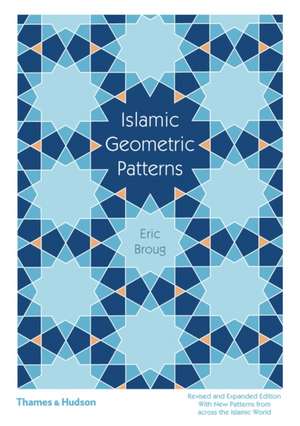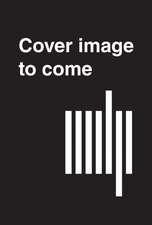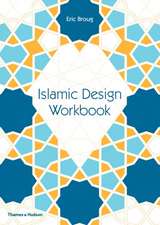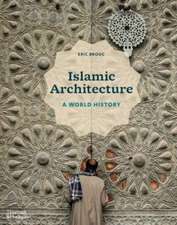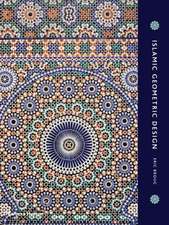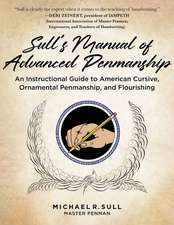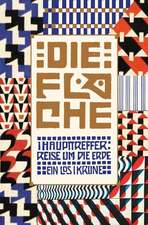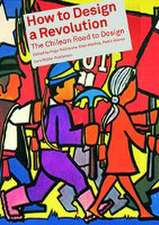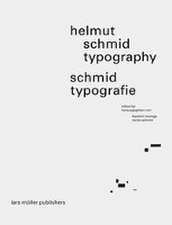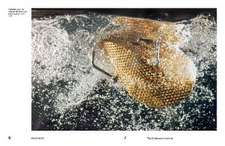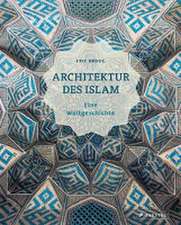Islamic Geometric Patterns
Autor Eric Brougen Limba Engleză Hardback – 17 ian 2019
Now, with the aid of this book, everyone can learn how to master this ancient art and create their own intricate patterns or re-create classic examples. All that is needed is a pencil, a ruler, a compass, and a steady hand. Technical tips demonstrate the geometric basics such as how to create designs from one of the foundational "family" shapes: a square, hexagon, or pentagon. This is followed by step-by-step instructions for reproducing some of the best examples of geometric patterns.
Islamic Geometric Patterns contains twenty-three geometric patterns and brief histories of some of the most famous and beautiful Islamic art and architecture from around the world. This revised edition features seven new patterns from locations including: Ak Medrese in Nigde, Turkey; Chellah necropolis in Rabat, Morocco; Shah Jahan Mosque in Thatta, Pakistan; the Tomb of I'timad-ud-Daulah in Agra, India; the Alcazar in Seville, Spain; Zaouia Moulay Idriss II in Fes, Morocco; and Darwish Pasha Mosque in Damascus, Syria.
Preț: 92.18 lei
Preț vechi: 108.90 lei
-15% Nou
17.64€ • 18.42$ • 14.60£
Carte disponibilă
Livrare economică 14-28 martie
Livrare express 28 februarie-06 martie pentru 45.40 lei
Specificații
ISBN-10: 0500294682
Pagini: 136
Ilustrații: 370 Illustrations, unspecified
Dimensiuni: 220 x 249 x 14 mm
Greutate: 0.45 kg
Ediția:Revised and expanded edition
Editura: Thames & Hudson
Notă biografică
Eric Broug runs Broug Ateliers for Islamic Architecture, Arts and Crafts. He is also the author of Islamic Design Workbook and Islamic Geometric Design, both published by Thames & Hudson.
Cuprins
Introduction ¿ 1. The Basics ¿ 2. Step-by-Step Construction: The Great Mosque of Cordoba; The Great Mosque of Kairouan; Mosque of Ibn Tulun; Esrefoglu Mosque; Capella Palatina; Ak Medrese; The `Abd al-Samad Complex; The Umayyad Mosque; The Great Mosque of Herat; Chella necropolis; The Alhambra; East Tower of Kharraqan; Shah Jahan Mosque; Al-Fahidi historical district; Mustansariyya Madrasa; Ben Yusuf Madrasa; Tomb of Itimad ud-Daula; The Alcazar; Mamluk Koran; Tomb of Bibi Jawindi; Qarawiyyin Mosque; Moulay Ishmael; Darwish Pasha Mosque ¿ Further reading
Descriere
The marvels of Islamic patterns--the most recognizable visual expression of Islamic art and architecture--are not just a beautiful accident. The ancient practitioners of this craft used traditional methods of measurement to create dazzling geometric compositions, often based on the repetition of a single pattern. The results are magnificent in their beauty and awe-inspiring in their execution.
Now, with the aid of this book, everyone can learn how to master this ancient art and create their own intricate patterns or re-create classic examples. All that is needed is a pencil, a ruler, a compass, and a steady hand. Technical tips demonstrate the geometric basics such as how to create designs from one of the foundational "family" shapes: a square, hexagon, or pentagon. This is followed by step-by-step instructions for reproducing some of the best examples of geometric patterns.
Islamic Geometric Patterns contains twenty-three geometric patterns and brief histories of some of the most famous and beautiful Islamic art and architecture from around the world. This revised edition features seven new patterns from locations including: Ak Medrese in Nigde, Turkey; Chellah necropolis in Rabat, Morocco; Shah Jahan Mosque in Thatta, Pakistan; the Tomb of I'timad-ud-Daulah in Agra, India; the Alcazar in Seville, Spain; Zaouia Moulay Idriss II in Fes, Morocco; and Darwish Pasha Mosque in Damascus, Syria.
